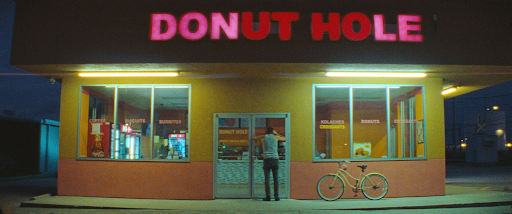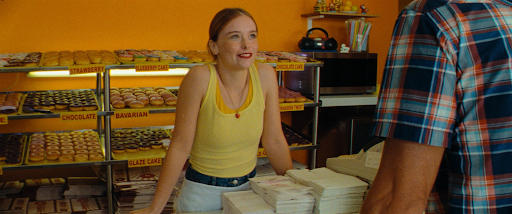The year is 2016. Election coverage is suffocating television screens across the country, and all the pollsters are reporting that Hillary Clinton is going to be the next president of the United States. “This is the year that election coverage first began to feel like a reality television show,” writer/director Sean Baker says when asked about the politics of his latest film, RED ROCKET. “I want both sides of the aisle to see this film… It’s an indictment of all politicians, politics in general. The characters absorb the election news the same way they absorb the court dramas and the reality shows.” The idea that art shouldn’t take an explicit partisan side in the clown show that is American electoral politics is a breath of fresh air in a post-2016 environment, and I’m certain I’m not alone there—the artist’s mission is to point out that the empire has no clothes, not tell us which emperor we should be supporting.
If Mikey Saber (Simon Rex) had been born under more privileged circumstances, he could’ve conceivably made it as a politician himself; after all, Mikey’s slick brand of charisma, manipulation, and narcissism aren’t exactly rare in Washington. Instead, he’s returning to his hometown of Texas City after a decades-long stint in Los Angeles as a once moderately successful but now failed porn star. No one is happy to see him, but he has nowhere else to go. Like many middle-aged men whose glory days are behind them, Mikey takes dick pills, relies on his ex for charity, and repeats his own past mistakes through grooming a teenage girl.

Everyone has met a Mikey Saber-type—maybe you met him on a road trip across the US, or you knew him in your own small town, or you bumped into him once in a bar. He’s charming and entertaining, but plays the victim when you don’t give him what he wants. And he wants something from everyone in his community. Specifically, Mikey wants a place to live from his estranged wife Lexi (Bree Elrod), a former porn star herself, and her mother Lil (Brenda Deiss), he wants free rides from timid neighbor Lonnie (Ethan Darbone), and he wants to sell weed for local supplier Leondria (Judy Hill) so that he can make some quick cash. All of these people have known Mikey his whole life, so they see his shit for what it is, and were ready to wave “Bye Bye Bye” to him the minute he crossed the straight line. Local jailbait Strawberry (Suzanna Son), however, is new to the Mikey show, and is subsequently enchanted by the gold that he spins from his web of shit. Any audience with eyes and an ounce of life experience can see what Mikey wants from her, and he goes one step further, pinning his hopes of a second shot at his own porn career on her.
Mikey’s salesman sleaze makes him deeply unlikeable, but Rex’s decision to play him as a lost boy humanizes the character in a performance so raw and vulnerable. The character from the Sean Baker cinematic universe Mikey reminds me of most is Moonee, who captured our hearts in THE FLORIDA PROJECT. Mikey and Moonee are both childlike in their selfishness, and they bolt from the consequences of their mistakes, but no matter how bad things get, they both ultimately maintain optimism in the face of American decay. When Moonee’s life is falling apart, she runs to the Magic Castle, whereas Mikey runs to the equivalent of that for aging, retired porn stars. To state the obvious, Mikey’s bad behavior can’t be written off as the misadventures of an eight-year-old, as Moonee’s can.
Real ‘90s/’00s heads will recognize Rex from his time as an MTV video jockey, his rap persona Dirt Nasty, or the SCARY MOVIE franchise, but what they may not have realized is that Rex began his career at 19 appearing in solo masturbation scenes under an alias, not unlike Mikey in the film. Baker’s casting of Simon Rex is crucial to the heart of RED ROCKET, and to his own career-long dedication to destigmatizing the lifestyles of sex workers, some of the least protected workers in America. Would working in porn look so appealing to Strawberry, and horny girls in economic situations like hers, if American culture didn’t reward narcissism with fame and fortune? If elected leaders on both the left and the right hadn’t abandoned the people living in rural areas many election cycles ago? As The American Dream becomes harder to achieve with the degradation of the social safety net, it has become easier than ever to make money commodifying our bodies with the dawn of the internet, especially in such a culture so starkly divided between sex positivity and sex negativity. Baker brings a more nuanced take on these polarizing discussions to the screen, urging audiences to confront their own discomfort surrounding sex and work in American life and culture.

Baker delicately balances the normalization of the lives of sex workers with not making the details look terribly glamorous or attractive through his signature photography. At once gritty and serene, Baker and cinematographer Drew Daniels craft their vision of the American psyche through wide shots of bike rides at sunset with plumes of toxic air billowing behind, through tracking shots of middle of nowhere Texas, the landscape out of Lonnie’s car window, through campy zooms onto Lexi’s lips in a triumphant moment as she tells Mikey who he really is. Baker can’t stay away from the pastel pinks of innocence, the baby blues of stretched-out American skies, and facetious American flag imagery that makes you lonesome for an American dream in a way that is difficult to articulate, but impossible not to feel.
The movement toward a contemporary cinema of American decay, of which Baker is a core filmmaker, isn’t new by any means. In the 2010s, A24 distributed SPRING BREAKERS, AMERICAN HONEY, Baker’s THE FLORIDA PROJECT, and in the 2020s, they have continued to do so with ZOLA and now RED ROCKET. These films tap into an EASY RIDER-esque vein of disillusionment in American life that runs deep in cinema history, and have found their way into the current mainstream because they bring real American lives to the audiences who crave an alternative to a profit-driven Hollywood system that relies on algorithms instead of artists. I’m personally interested to see where this thread of cinematic inquiry takes us, and I hope you are, too.















Comments